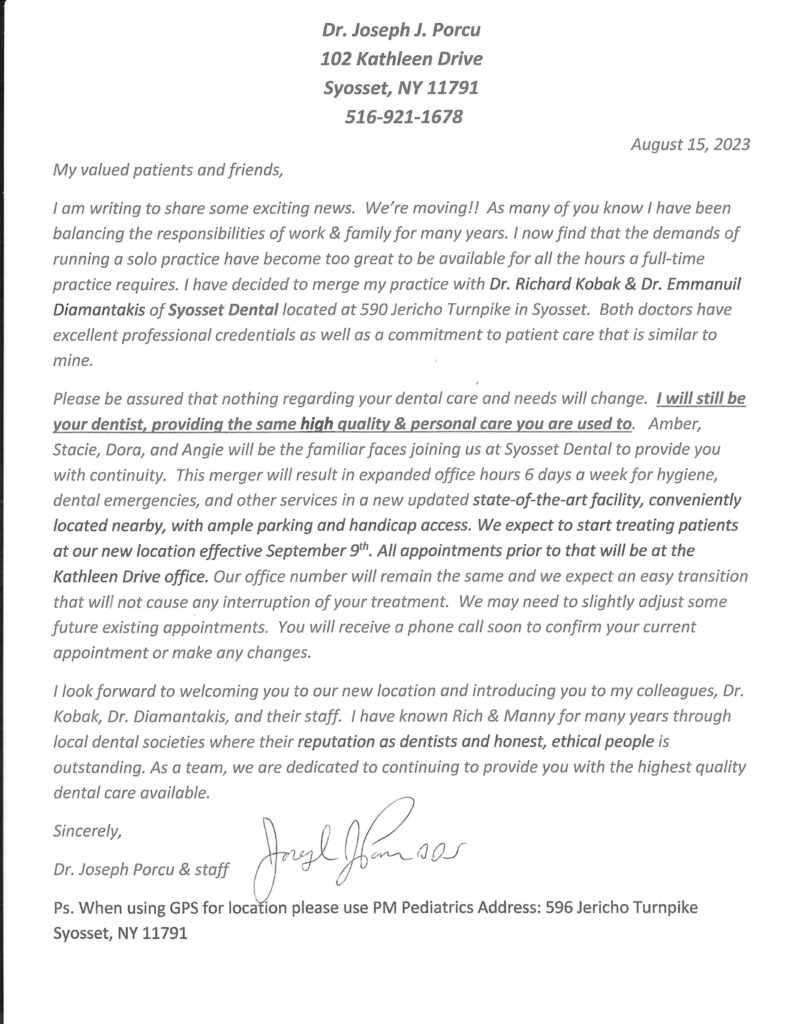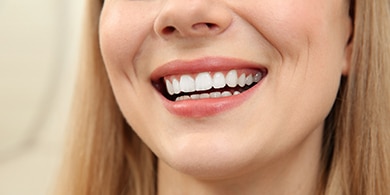 Did you know that April is Stress Awareness Month? Unfortunately, stress is an increasing issue for nearly everyone these days, regardless of age. While you may be nodding your head in agreement, you may not realize the effect that stress has on your overall health. Not only can it cause insomnia, digestive issues, and skin problems – but it can also damage your teeth. In fact, stress can lead to several dental conditions such as; gum disease, bruxism, TMJ disorder, and even more. So, how does stress contribute to each of these complications? Let’s take a closer look. (more…)
Did you know that April is Stress Awareness Month? Unfortunately, stress is an increasing issue for nearly everyone these days, regardless of age. While you may be nodding your head in agreement, you may not realize the effect that stress has on your overall health. Not only can it cause insomnia, digestive issues, and skin problems – but it can also damage your teeth. In fact, stress can lead to several dental conditions such as; gum disease, bruxism, TMJ disorder, and even more. So, how does stress contribute to each of these complications? Let’s take a closer look. (more…)
How To Stop Grinding Your Teeth
 Many of us grind or clench our teeth at some point, although most children grow out of the habit. Unfortunately, chronic grinding or clenching – medically known as bruxism – can be damaging to your teeth and overall oral health, especially in severe cases. It often occurs throughout the sleep cycle (known as sleep bruxism) and like other sleep disorders, can be difficult to diagnose. Stopping this habit can be even more difficult, as there are many factors that can contribute to it. However, it is necessary in order to protect your teeth. If you’re suffering from tooth sensitivity or are noticing excessive wear on your teeth – it may be time for a trip to your dentist, they can help you to stop grinding your teeth. (more…)
Many of us grind or clench our teeth at some point, although most children grow out of the habit. Unfortunately, chronic grinding or clenching – medically known as bruxism – can be damaging to your teeth and overall oral health, especially in severe cases. It often occurs throughout the sleep cycle (known as sleep bruxism) and like other sleep disorders, can be difficult to diagnose. Stopping this habit can be even more difficult, as there are many factors that can contribute to it. However, it is necessary in order to protect your teeth. If you’re suffering from tooth sensitivity or are noticing excessive wear on your teeth – it may be time for a trip to your dentist, they can help you to stop grinding your teeth. (more…)
What Causes Gum Disease?
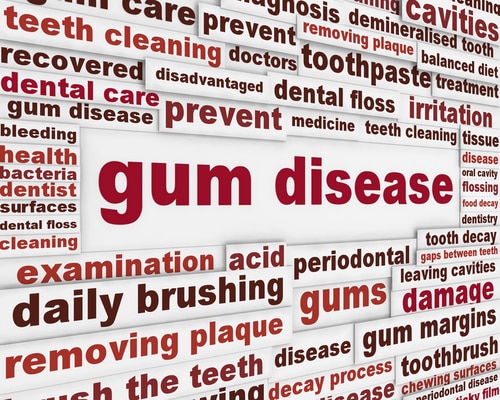 A large part of the population suffers from some form of gum disease – or periodontitis. It can actually be reversed if caught in it’s early stages, known as gingivitis. However, just like other infections, gum disease can spread quickly and begin to affect your overall health. In the worst cases of periodontitis – you could risk losing teeth. Fortunately, this is completely avoidable by practicing preventive dentistry! Each component targets the infection-causing bacteria around your mouth, ultimately optimizing your oral health. Additionally, you can never know too much – understanding the causes and symptoms of gum disease can help you to take action as soon as possible. (more…)
A large part of the population suffers from some form of gum disease – or periodontitis. It can actually be reversed if caught in it’s early stages, known as gingivitis. However, just like other infections, gum disease can spread quickly and begin to affect your overall health. In the worst cases of periodontitis – you could risk losing teeth. Fortunately, this is completely avoidable by practicing preventive dentistry! Each component targets the infection-causing bacteria around your mouth, ultimately optimizing your oral health. Additionally, you can never know too much – understanding the causes and symptoms of gum disease can help you to take action as soon as possible. (more…)
Facts About Tooth-Colored Fillings
 In the past, amalgam (silver) fillings have been a common choice for restoring teeth from cavity damage, although now, their days are definitely numbered. Despite the proven durability of amalgam over the past century, its dark appearance (among other factors) have led metal fillings to become increasingly unattractive. Nowadays, many patients are opting to restore their cavities with a tooth-colored material – known as composite-resin. Not only is this a far more cosmetically appealing option, but it also provides a strong, safe, and comfortable restoration. (more…)
In the past, amalgam (silver) fillings have been a common choice for restoring teeth from cavity damage, although now, their days are definitely numbered. Despite the proven durability of amalgam over the past century, its dark appearance (among other factors) have led metal fillings to become increasingly unattractive. Nowadays, many patients are opting to restore their cavities with a tooth-colored material – known as composite-resin. Not only is this a far more cosmetically appealing option, but it also provides a strong, safe, and comfortable restoration. (more…)
Patient’s Guide To Detecting Cavities
 According to a report done by the National Institute of Dental and Craniofacial Research (NIDCR), 92% of adults (ages 20-64) have had at least one cavity in their permanent teeth. While we know preventive dentistry can keep the infection-causing bacteria at bay, if you were to leave decay untreated it could cause further health complications like an abscess or even loss, altogether. The sooner you’re able to catch a cavity, the easier it is to treat. In fact, your dentist may even be able to reverse a cavity, if they detect it in its earliest stages. (more…)
According to a report done by the National Institute of Dental and Craniofacial Research (NIDCR), 92% of adults (ages 20-64) have had at least one cavity in their permanent teeth. While we know preventive dentistry can keep the infection-causing bacteria at bay, if you were to leave decay untreated it could cause further health complications like an abscess or even loss, altogether. The sooner you’re able to catch a cavity, the easier it is to treat. In fact, your dentist may even be able to reverse a cavity, if they detect it in its earliest stages. (more…)
The Link Between Jaw Pain And Headaches
 While headaches are typically felt at the top of your head, the pain could actually be coming from your jaw. The jaw structure is connected to the skull by two temporomandibular joints – acting just like hinges, these joints allow your jaw to open and close for daily functions like speaking and chewing. When problems (irritation or inflammation) arise with the joint and surrounding facial muscles, it can lead to a disorder simply known as TMD (temporomandibular joint disorder). This muscle tension in your face can often cause headaches and, in severe cases; migraines. (more…)
While headaches are typically felt at the top of your head, the pain could actually be coming from your jaw. The jaw structure is connected to the skull by two temporomandibular joints – acting just like hinges, these joints allow your jaw to open and close for daily functions like speaking and chewing. When problems (irritation or inflammation) arise with the joint and surrounding facial muscles, it can lead to a disorder simply known as TMD (temporomandibular joint disorder). This muscle tension in your face can often cause headaches and, in severe cases; migraines. (more…)
The Longevity Of Dental Implants
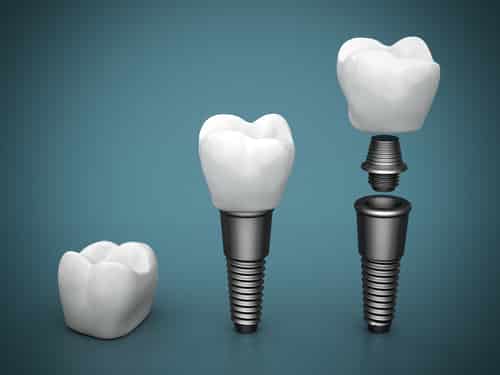 Dental implants have become increasingly popular for restoring lost teeth – especially over the last few decades. A major concern when you lose an ‘adult’ tooth is that it’s root is not able to stimulate your jawbone anymore because without this stimulation, your bone structure will deteriorate over time. A huge advantage that dental implants have is their ability to physically fuse together with your jawbone because they’re made of titanium – a biocompatible material. For qualified candidates, this isn’t its only advantage, either – the metal itself is extremely durable and able to resist damage from bacteria. Even still, dental implants require you to properly brush and floss as poor oral health can compromise the longevity of your new tooth. (more…)
Dental implants have become increasingly popular for restoring lost teeth – especially over the last few decades. A major concern when you lose an ‘adult’ tooth is that it’s root is not able to stimulate your jawbone anymore because without this stimulation, your bone structure will deteriorate over time. A huge advantage that dental implants have is their ability to physically fuse together with your jawbone because they’re made of titanium – a biocompatible material. For qualified candidates, this isn’t its only advantage, either – the metal itself is extremely durable and able to resist damage from bacteria. Even still, dental implants require you to properly brush and floss as poor oral health can compromise the longevity of your new tooth. (more…)
Common Gum Disease Myths Debunked!
 Gum disease can range from mild forms of gingivitis to severe cases of periodontitis. In either situation, it can be painful and can drastically compromise your oral health. As with any infection, the earlier you’re able to catch gum disease, the easier it can be to treat. However, there is a lot of misinformation out there surrounding the topic – sometimes causing patients to wait until the gum disease has progressed too far to seek out a dental professional for help. So let’s debunk those common gum disease myths so you know when to visit your dentist. (more…)
Gum disease can range from mild forms of gingivitis to severe cases of periodontitis. In either situation, it can be painful and can drastically compromise your oral health. As with any infection, the earlier you’re able to catch gum disease, the easier it can be to treat. However, there is a lot of misinformation out there surrounding the topic – sometimes causing patients to wait until the gum disease has progressed too far to seek out a dental professional for help. So let’s debunk those common gum disease myths so you know when to visit your dentist. (more…)
Take-Home Trays Vs. In-Office Teeth Whitening
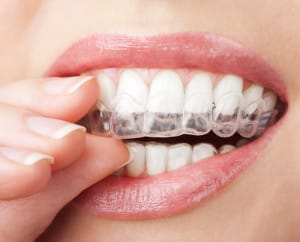 Have you noticed discoloration in your smile lately? While you may be inclined to whiten your smile on your own, it is always recommended to avoid over-the-counter kits or other products as they could potentially cause damage to your teeth without providing results. Don’t feel discouraged because there isn’t anything you’re able to do on your own – at Syosset Dental we offer a couple different options to give you the pearly whites you desire. What works best will vary for each individual patient, but both options have pros and cons. So, let’s compare your options; take-home trays vs. in-office teeth whitening. (more…)
Have you noticed discoloration in your smile lately? While you may be inclined to whiten your smile on your own, it is always recommended to avoid over-the-counter kits or other products as they could potentially cause damage to your teeth without providing results. Don’t feel discouraged because there isn’t anything you’re able to do on your own – at Syosset Dental we offer a couple different options to give you the pearly whites you desire. What works best will vary for each individual patient, but both options have pros and cons. So, let’s compare your options; take-home trays vs. in-office teeth whitening. (more…)
Top 3 Causes Of Canker Sores
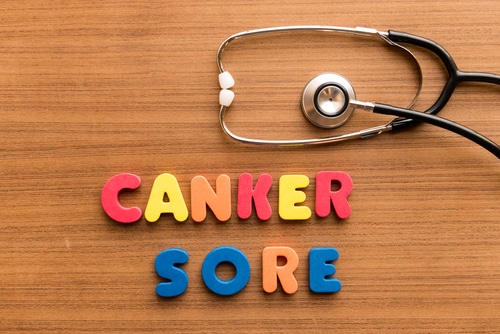 Canker sores can be painful, sometimes making it difficult for you to eat, brush your teeth, and perform other daily tasks that you wouldn’t otherwise think about – like talking. There are two different types of these ulcers; “simple” and “complex.” While they’re both undoubtedly uncomfortable, knowing which type of canker sore you have could help you determine what is causing these painful lesions. Typically, these sores can heal without treatment within one to two weeks, but, if they persist, it may be time to consult with your dentist. Knowing the cause behind your canker sores will help you to take the proper measures to avoid them. (more…)
Canker sores can be painful, sometimes making it difficult for you to eat, brush your teeth, and perform other daily tasks that you wouldn’t otherwise think about – like talking. There are two different types of these ulcers; “simple” and “complex.” While they’re both undoubtedly uncomfortable, knowing which type of canker sore you have could help you determine what is causing these painful lesions. Typically, these sores can heal without treatment within one to two weeks, but, if they persist, it may be time to consult with your dentist. Knowing the cause behind your canker sores will help you to take the proper measures to avoid them. (more…)
